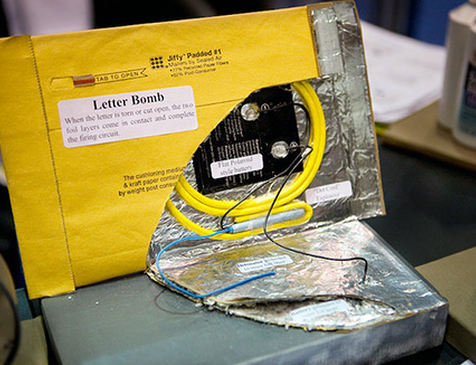A group using the name of the IRA has claimed responsibility for a series of potentially viable explosive devices sent to British military recruitment centres, police said Monday.
Seven crude devices were mailed to armed forces careers offices in southeast England last week. None went off or caused any injuries.
British government officials said at the time that the devices bore the hallmarks of Northern Irish terror attacks.
Police said on Monday that a claim had been made on behalf of the Irish Republican Army (IRA) paramilitary group.
“The claim was received on Saturday, 15 February by a Northern Irish media outlet using a recognised codeword. The claim was allegedly made on behalf of the ‘IRA’,” a statement from London’s Metropolitan Police said.
The IRA formally ended its armed campaign in 2005, pledging it would use purely peaceful and democratic means towards achieving its goal of a united Ireland.
However, small, dissident splinter groups remain wedded to violence against British state institutions.
Belfast-based newspaper The Irish News reported receiving a statement claiming responsibility for the devices.
The statement said: “The IRA claims responsibility for the explosive devices that were sent to British armed forces recruitment centres in England. Attacks will continue when and where the IRA see fit.”
The caller used a recognised codeword — the practice in Northern Ireland when warning of impending terror attacks or claiming responsibility for them, used so the recipient knows it is genuine.
Police urged people to remain vigilant and report anything suspicious.
Dissident republican paramilitary groups reject the peace process in Northern Ireland and continue to carry out attacks, with the intention of destabilising the province and the power-sharing arrangements between the Protestant British and Catholic Irish communities.
These splinter groups include the Continuity IRA and the New IRA, which incorporates the better-known Real IRA.
The New IRA was blamed for letter bombs sent in October to Britain’s Northern Ireland minister and the province’s police chief.
Around 3,500 people died in Northern Ireland’s three decades of violence between Protestants, favouring continued union with Britain, and Catholics seeking a unified Ireland. A 1998 peace agreement largely ended the conflict.
The IRA’s political wing Sinn Fein is now part of the power-sharing government in Belfast, formed of Catholic and Protestant parties.
The current threat level for Northern Ireland-related terrorism is severe within Northern Ireland — the second-highest of the five threat levels — meaning an attack is considered highly likely.
It is rated moderate in mainland Britain — level four of five — meaning an attack is considered possible, but not thought likely.

COMMENTS
Please let us know if you're having issues with commenting.